Cloud ERP: Definition, Benefits and Empirical Evidence
VerifiedAdded on 2023/06/14
|16
|3581
|450
AI Summary
This report discusses the definition, benefits and empirical evidence of Cloud ERP. It covers academic and industry perspectives, benefits of Cloud ERP, and empirical evidence supporting its implementation.
Contribute Materials
Your contribution can guide someone’s learning journey. Share your
documents today.
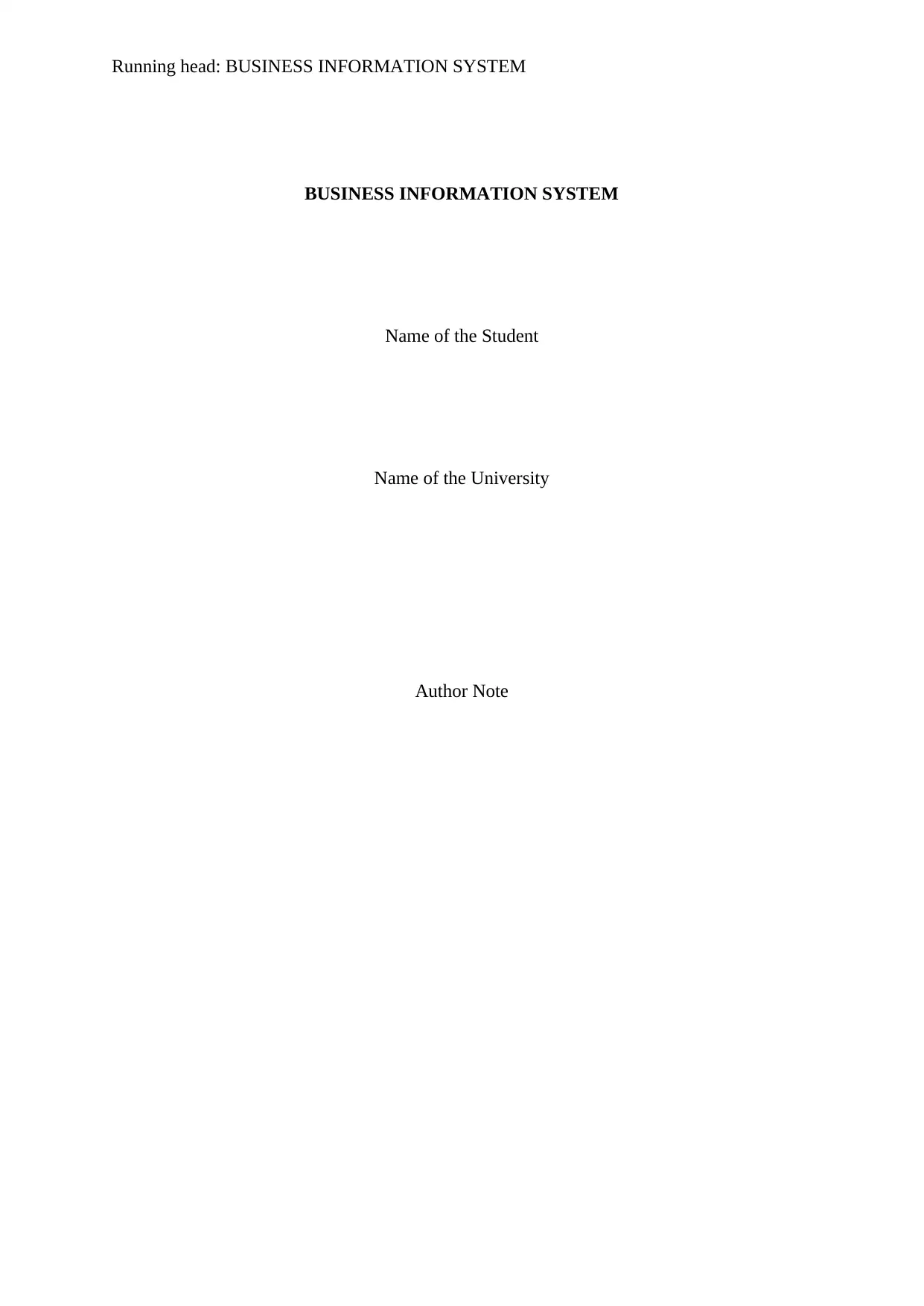
Running head: BUSINESS INFORMATION SYSTEM
BUSINESS INFORMATION SYSTEM
Name of the Student
Name of the University
Author Note
BUSINESS INFORMATION SYSTEM
Name of the Student
Name of the University
Author Note
Secure Best Marks with AI Grader
Need help grading? Try our AI Grader for instant feedback on your assignments.
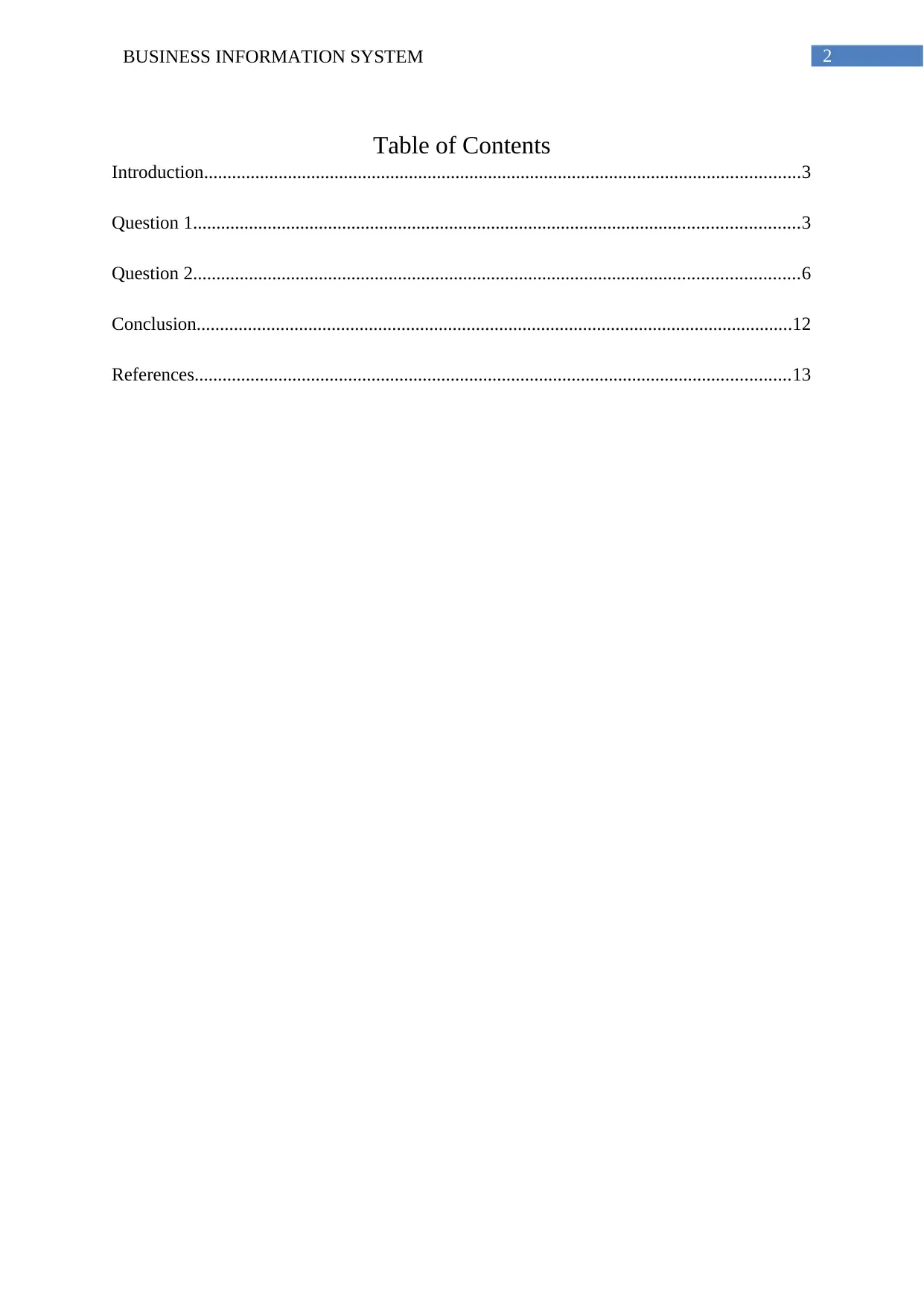
2BUSINESS INFORMATION SYSTEM
Table of Contents
Introduction................................................................................................................................3
Question 1..................................................................................................................................3
Question 2..................................................................................................................................6
Conclusion................................................................................................................................12
References................................................................................................................................13
Table of Contents
Introduction................................................................................................................................3
Question 1..................................................................................................................................3
Question 2..................................................................................................................................6
Conclusion................................................................................................................................12
References................................................................................................................................13
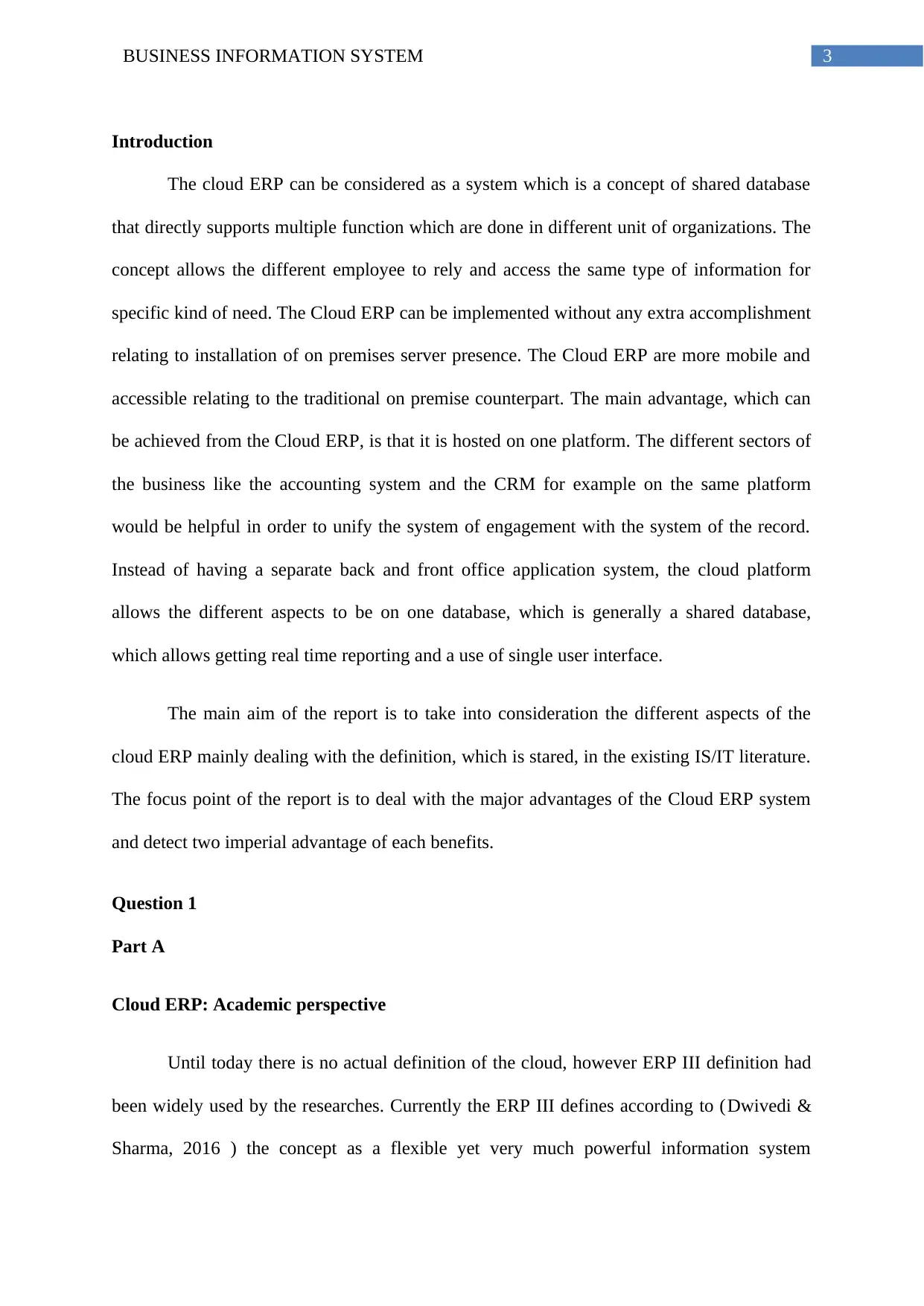
3BUSINESS INFORMATION SYSTEM
Introduction
The cloud ERP can be considered as a system which is a concept of shared database
that directly supports multiple function which are done in different unit of organizations. The
concept allows the different employee to rely and access the same type of information for
specific kind of need. The Cloud ERP can be implemented without any extra accomplishment
relating to installation of on premises server presence. The Cloud ERP are more mobile and
accessible relating to the traditional on premise counterpart. The main advantage, which can
be achieved from the Cloud ERP, is that it is hosted on one platform. The different sectors of
the business like the accounting system and the CRM for example on the same platform
would be helpful in order to unify the system of engagement with the system of the record.
Instead of having a separate back and front office application system, the cloud platform
allows the different aspects to be on one database, which is generally a shared database,
which allows getting real time reporting and a use of single user interface.
The main aim of the report is to take into consideration the different aspects of the
cloud ERP mainly dealing with the definition, which is stared, in the existing IS/IT literature.
The focus point of the report is to deal with the major advantages of the Cloud ERP system
and detect two imperial advantage of each benefits.
Question 1
Part A
Cloud ERP: Academic perspective
Until today there is no actual definition of the cloud, however ERP III definition had
been widely used by the researches. Currently the ERP III defines according to (Dwivedi &
Sharma, 2016 ) the concept as a flexible yet very much powerful information system
Introduction
The cloud ERP can be considered as a system which is a concept of shared database
that directly supports multiple function which are done in different unit of organizations. The
concept allows the different employee to rely and access the same type of information for
specific kind of need. The Cloud ERP can be implemented without any extra accomplishment
relating to installation of on premises server presence. The Cloud ERP are more mobile and
accessible relating to the traditional on premise counterpart. The main advantage, which can
be achieved from the Cloud ERP, is that it is hosted on one platform. The different sectors of
the business like the accounting system and the CRM for example on the same platform
would be helpful in order to unify the system of engagement with the system of the record.
Instead of having a separate back and front office application system, the cloud platform
allows the different aspects to be on one database, which is generally a shared database,
which allows getting real time reporting and a use of single user interface.
The main aim of the report is to take into consideration the different aspects of the
cloud ERP mainly dealing with the definition, which is stared, in the existing IS/IT literature.
The focus point of the report is to deal with the major advantages of the Cloud ERP system
and detect two imperial advantage of each benefits.
Question 1
Part A
Cloud ERP: Academic perspective
Until today there is no actual definition of the cloud, however ERP III definition had
been widely used by the researches. Currently the ERP III defines according to (Dwivedi &
Sharma, 2016 ) the concept as a flexible yet very much powerful information system
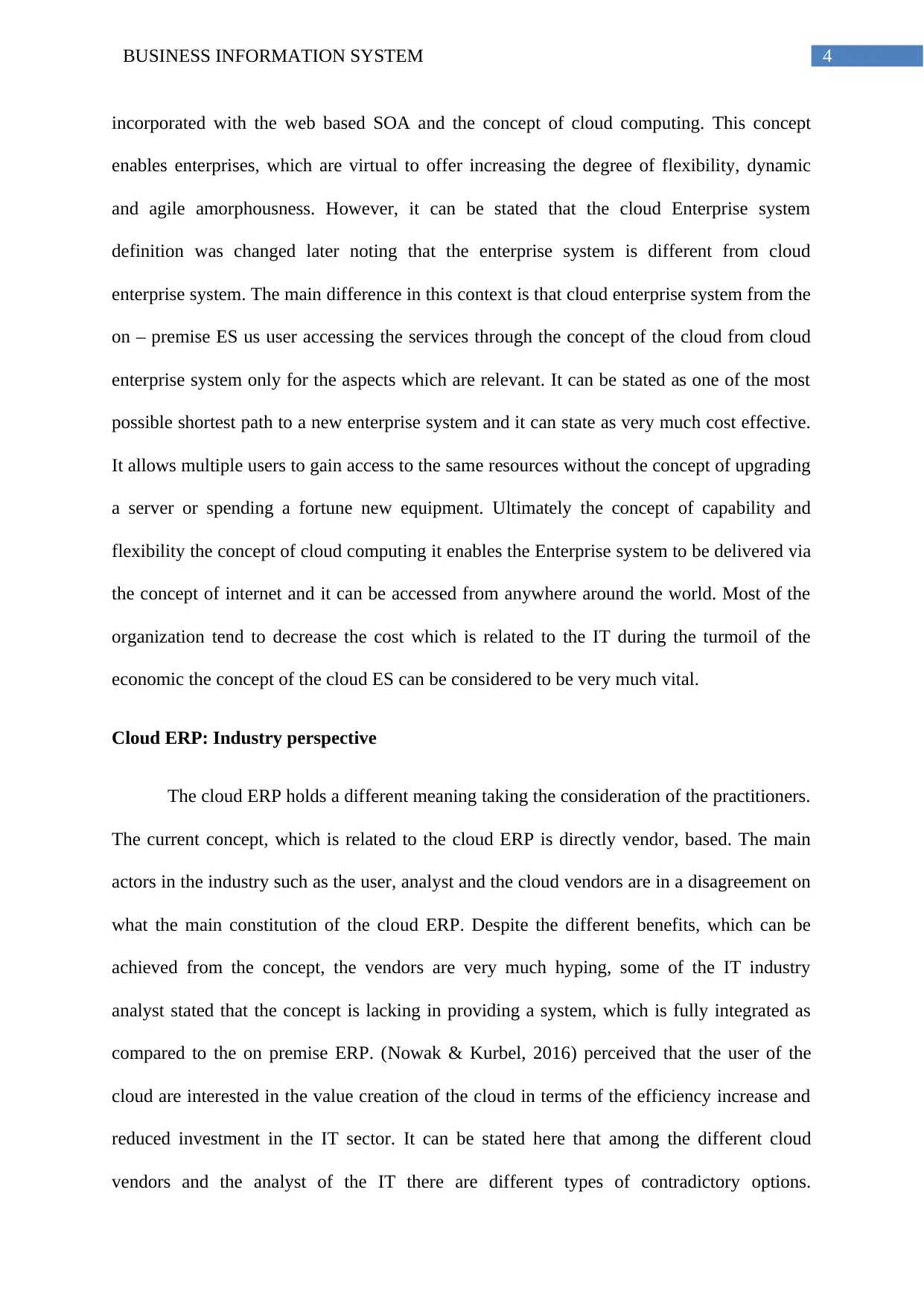
4BUSINESS INFORMATION SYSTEM
incorporated with the web based SOA and the concept of cloud computing. This concept
enables enterprises, which are virtual to offer increasing the degree of flexibility, dynamic
and agile amorphousness. However, it can be stated that the cloud Enterprise system
definition was changed later noting that the enterprise system is different from cloud
enterprise system. The main difference in this context is that cloud enterprise system from the
on – premise ES us user accessing the services through the concept of the cloud from cloud
enterprise system only for the aspects which are relevant. It can be stated as one of the most
possible shortest path to a new enterprise system and it can state as very much cost effective.
It allows multiple users to gain access to the same resources without the concept of upgrading
a server or spending a fortune new equipment. Ultimately the concept of capability and
flexibility the concept of cloud computing it enables the Enterprise system to be delivered via
the concept of internet and it can be accessed from anywhere around the world. Most of the
organization tend to decrease the cost which is related to the IT during the turmoil of the
economic the concept of the cloud ES can be considered to be very much vital.
Cloud ERP: Industry perspective
The cloud ERP holds a different meaning taking the consideration of the practitioners.
The current concept, which is related to the cloud ERP is directly vendor, based. The main
actors in the industry such as the user, analyst and the cloud vendors are in a disagreement on
what the main constitution of the cloud ERP. Despite the different benefits, which can be
achieved from the concept, the vendors are very much hyping, some of the IT industry
analyst stated that the concept is lacking in providing a system, which is fully integrated as
compared to the on premise ERP. (Nowak & Kurbel, 2016) perceived that the user of the
cloud are interested in the value creation of the cloud in terms of the efficiency increase and
reduced investment in the IT sector. It can be stated here that among the different cloud
vendors and the analyst of the IT there are different types of contradictory options.
incorporated with the web based SOA and the concept of cloud computing. This concept
enables enterprises, which are virtual to offer increasing the degree of flexibility, dynamic
and agile amorphousness. However, it can be stated that the cloud Enterprise system
definition was changed later noting that the enterprise system is different from cloud
enterprise system. The main difference in this context is that cloud enterprise system from the
on – premise ES us user accessing the services through the concept of the cloud from cloud
enterprise system only for the aspects which are relevant. It can be stated as one of the most
possible shortest path to a new enterprise system and it can state as very much cost effective.
It allows multiple users to gain access to the same resources without the concept of upgrading
a server or spending a fortune new equipment. Ultimately the concept of capability and
flexibility the concept of cloud computing it enables the Enterprise system to be delivered via
the concept of internet and it can be accessed from anywhere around the world. Most of the
organization tend to decrease the cost which is related to the IT during the turmoil of the
economic the concept of the cloud ES can be considered to be very much vital.
Cloud ERP: Industry perspective
The cloud ERP holds a different meaning taking the consideration of the practitioners.
The current concept, which is related to the cloud ERP is directly vendor, based. The main
actors in the industry such as the user, analyst and the cloud vendors are in a disagreement on
what the main constitution of the cloud ERP. Despite the different benefits, which can be
achieved from the concept, the vendors are very much hyping, some of the IT industry
analyst stated that the concept is lacking in providing a system, which is fully integrated as
compared to the on premise ERP. (Nowak & Kurbel, 2016) perceived that the user of the
cloud are interested in the value creation of the cloud in terms of the efficiency increase and
reduced investment in the IT sector. It can be stated here that among the different cloud
vendors and the analyst of the IT there are different types of contradictory options.
Secure Best Marks with AI Grader
Need help grading? Try our AI Grader for instant feedback on your assignments.
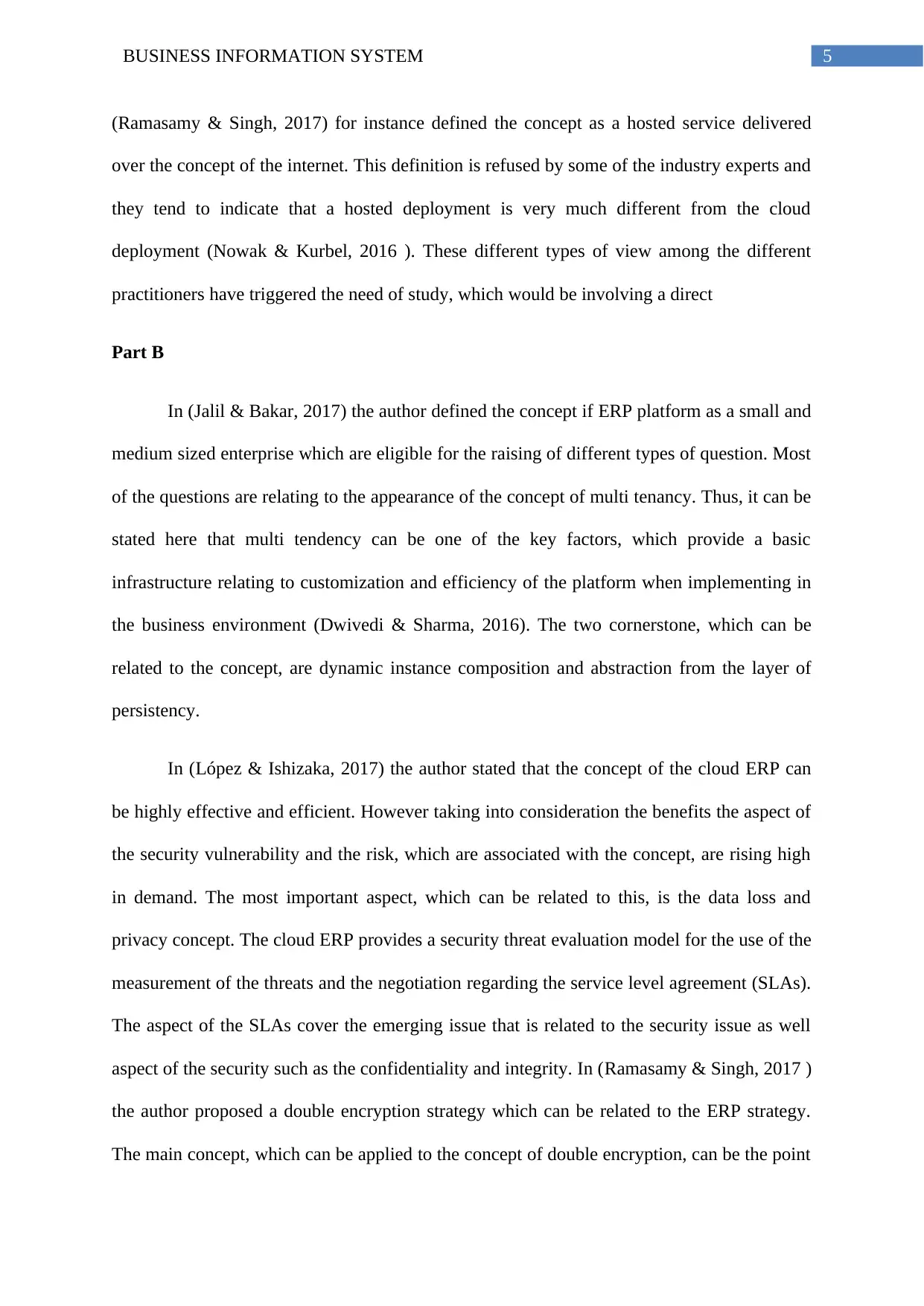
5BUSINESS INFORMATION SYSTEM
(Ramasamy & Singh, 2017) for instance defined the concept as a hosted service delivered
over the concept of the internet. This definition is refused by some of the industry experts and
they tend to indicate that a hosted deployment is very much different from the cloud
deployment (Nowak & Kurbel, 2016 ). These different types of view among the different
practitioners have triggered the need of study, which would be involving a direct
Part B
In (Jalil & Bakar, 2017) the author defined the concept if ERP platform as a small and
medium sized enterprise which are eligible for the raising of different types of question. Most
of the questions are relating to the appearance of the concept of multi tenancy. Thus, it can be
stated here that multi tendency can be one of the key factors, which provide a basic
infrastructure relating to customization and efficiency of the platform when implementing in
the business environment (Dwivedi & Sharma, 2016). The two cornerstone, which can be
related to the concept, are dynamic instance composition and abstraction from the layer of
persistency.
In (López & Ishizaka, 2017) the author stated that the concept of the cloud ERP can
be highly effective and efficient. However taking into consideration the benefits the aspect of
the security vulnerability and the risk, which are associated with the concept, are rising high
in demand. The most important aspect, which can be related to this, is the data loss and
privacy concept. The cloud ERP provides a security threat evaluation model for the use of the
measurement of the threats and the negotiation regarding the service level agreement (SLAs).
The aspect of the SLAs cover the emerging issue that is related to the security issue as well
aspect of the security such as the confidentiality and integrity. In (Ramasamy & Singh, 2017 )
the author proposed a double encryption strategy which can be related to the ERP strategy.
The main concept, which can be applied to the concept of double encryption, can be the point
(Ramasamy & Singh, 2017) for instance defined the concept as a hosted service delivered
over the concept of the internet. This definition is refused by some of the industry experts and
they tend to indicate that a hosted deployment is very much different from the cloud
deployment (Nowak & Kurbel, 2016 ). These different types of view among the different
practitioners have triggered the need of study, which would be involving a direct
Part B
In (Jalil & Bakar, 2017) the author defined the concept if ERP platform as a small and
medium sized enterprise which are eligible for the raising of different types of question. Most
of the questions are relating to the appearance of the concept of multi tenancy. Thus, it can be
stated here that multi tendency can be one of the key factors, which provide a basic
infrastructure relating to customization and efficiency of the platform when implementing in
the business environment (Dwivedi & Sharma, 2016). The two cornerstone, which can be
related to the concept, are dynamic instance composition and abstraction from the layer of
persistency.
In (López & Ishizaka, 2017) the author stated that the concept of the cloud ERP can
be highly effective and efficient. However taking into consideration the benefits the aspect of
the security vulnerability and the risk, which are associated with the concept, are rising high
in demand. The most important aspect, which can be related to this, is the data loss and
privacy concept. The cloud ERP provides a security threat evaluation model for the use of the
measurement of the threats and the negotiation regarding the service level agreement (SLAs).
The aspect of the SLAs cover the emerging issue that is related to the security issue as well
aspect of the security such as the confidentiality and integrity. In (Ramasamy & Singh, 2017 )
the author proposed a double encryption strategy which can be related to the ERP strategy.
The main concept, which can be applied to the concept of double encryption, can be the point
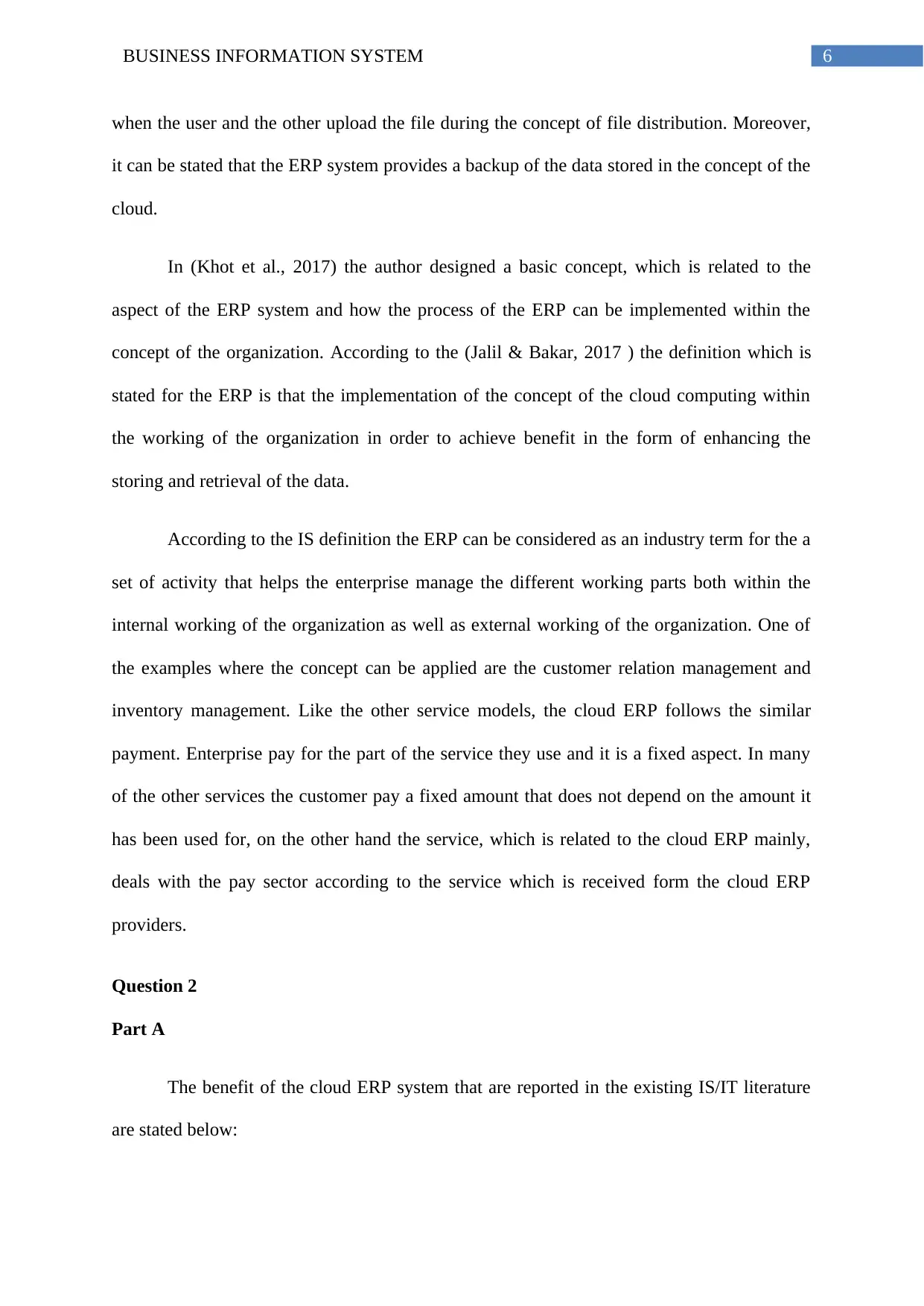
6BUSINESS INFORMATION SYSTEM
when the user and the other upload the file during the concept of file distribution. Moreover,
it can be stated that the ERP system provides a backup of the data stored in the concept of the
cloud.
In (Khot et al., 2017) the author designed a basic concept, which is related to the
aspect of the ERP system and how the process of the ERP can be implemented within the
concept of the organization. According to the (Jalil & Bakar, 2017 ) the definition which is
stated for the ERP is that the implementation of the concept of the cloud computing within
the working of the organization in order to achieve benefit in the form of enhancing the
storing and retrieval of the data.
According to the IS definition the ERP can be considered as an industry term for the a
set of activity that helps the enterprise manage the different working parts both within the
internal working of the organization as well as external working of the organization. One of
the examples where the concept can be applied are the customer relation management and
inventory management. Like the other service models, the cloud ERP follows the similar
payment. Enterprise pay for the part of the service they use and it is a fixed aspect. In many
of the other services the customer pay a fixed amount that does not depend on the amount it
has been used for, on the other hand the service, which is related to the cloud ERP mainly,
deals with the pay sector according to the service which is received form the cloud ERP
providers.
Question 2
Part A
The benefit of the cloud ERP system that are reported in the existing IS/IT literature
are stated below:
when the user and the other upload the file during the concept of file distribution. Moreover,
it can be stated that the ERP system provides a backup of the data stored in the concept of the
cloud.
In (Khot et al., 2017) the author designed a basic concept, which is related to the
aspect of the ERP system and how the process of the ERP can be implemented within the
concept of the organization. According to the (Jalil & Bakar, 2017 ) the definition which is
stated for the ERP is that the implementation of the concept of the cloud computing within
the working of the organization in order to achieve benefit in the form of enhancing the
storing and retrieval of the data.
According to the IS definition the ERP can be considered as an industry term for the a
set of activity that helps the enterprise manage the different working parts both within the
internal working of the organization as well as external working of the organization. One of
the examples where the concept can be applied are the customer relation management and
inventory management. Like the other service models, the cloud ERP follows the similar
payment. Enterprise pay for the part of the service they use and it is a fixed aspect. In many
of the other services the customer pay a fixed amount that does not depend on the amount it
has been used for, on the other hand the service, which is related to the cloud ERP mainly,
deals with the pay sector according to the service which is received form the cloud ERP
providers.
Question 2
Part A
The benefit of the cloud ERP system that are reported in the existing IS/IT literature
are stated below:
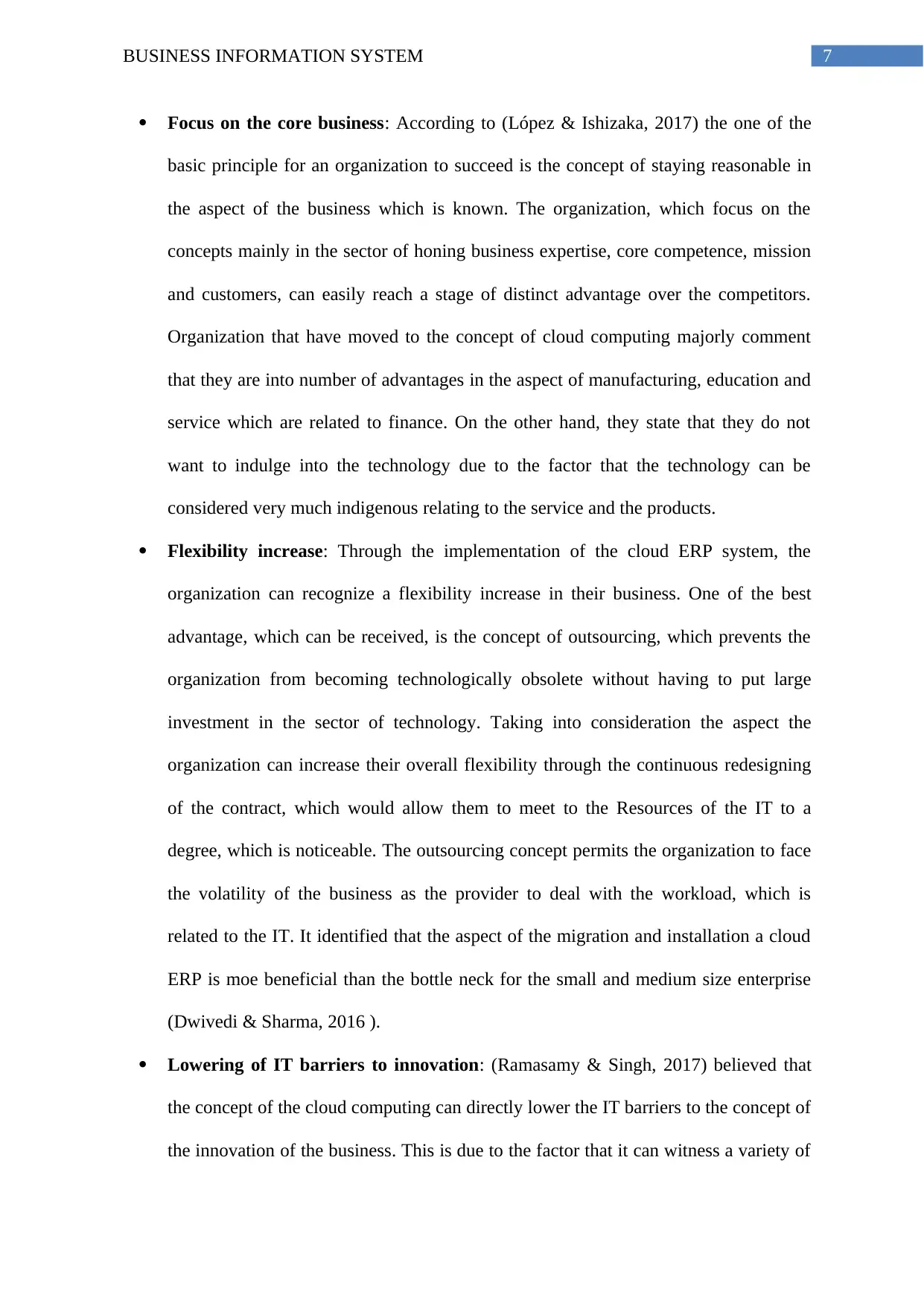
7BUSINESS INFORMATION SYSTEM
Focus on the core business: According to (López & Ishizaka, 2017) the one of the
basic principle for an organization to succeed is the concept of staying reasonable in
the aspect of the business which is known. The organization, which focus on the
concepts mainly in the sector of honing business expertise, core competence, mission
and customers, can easily reach a stage of distinct advantage over the competitors.
Organization that have moved to the concept of cloud computing majorly comment
that they are into number of advantages in the aspect of manufacturing, education and
service which are related to finance. On the other hand, they state that they do not
want to indulge into the technology due to the factor that the technology can be
considered very much indigenous relating to the service and the products.
Flexibility increase: Through the implementation of the cloud ERP system, the
organization can recognize a flexibility increase in their business. One of the best
advantage, which can be received, is the concept of outsourcing, which prevents the
organization from becoming technologically obsolete without having to put large
investment in the sector of technology. Taking into consideration the aspect the
organization can increase their overall flexibility through the continuous redesigning
of the contract, which would allow them to meet to the Resources of the IT to a
degree, which is noticeable. The outsourcing concept permits the organization to face
the volatility of the business as the provider to deal with the workload, which is
related to the IT. It identified that the aspect of the migration and installation a cloud
ERP is moe beneficial than the bottle neck for the small and medium size enterprise
(Dwivedi & Sharma, 2016 ).
Lowering of IT barriers to innovation: (Ramasamy & Singh, 2017) believed that
the concept of the cloud computing can directly lower the IT barriers to the concept of
the innovation of the business. This is due to the factor that it can witness a variety of
Focus on the core business: According to (López & Ishizaka, 2017) the one of the
basic principle for an organization to succeed is the concept of staying reasonable in
the aspect of the business which is known. The organization, which focus on the
concepts mainly in the sector of honing business expertise, core competence, mission
and customers, can easily reach a stage of distinct advantage over the competitors.
Organization that have moved to the concept of cloud computing majorly comment
that they are into number of advantages in the aspect of manufacturing, education and
service which are related to finance. On the other hand, they state that they do not
want to indulge into the technology due to the factor that the technology can be
considered very much indigenous relating to the service and the products.
Flexibility increase: Through the implementation of the cloud ERP system, the
organization can recognize a flexibility increase in their business. One of the best
advantage, which can be received, is the concept of outsourcing, which prevents the
organization from becoming technologically obsolete without having to put large
investment in the sector of technology. Taking into consideration the aspect the
organization can increase their overall flexibility through the continuous redesigning
of the contract, which would allow them to meet to the Resources of the IT to a
degree, which is noticeable. The outsourcing concept permits the organization to face
the volatility of the business as the provider to deal with the workload, which is
related to the IT. It identified that the aspect of the migration and installation a cloud
ERP is moe beneficial than the bottle neck for the small and medium size enterprise
(Dwivedi & Sharma, 2016 ).
Lowering of IT barriers to innovation: (Ramasamy & Singh, 2017) believed that
the concept of the cloud computing can directly lower the IT barriers to the concept of
the innovation of the business. This is due to the factor that it can witness a variety of
Paraphrase This Document
Need a fresh take? Get an instant paraphrase of this document with our AI Paraphraser
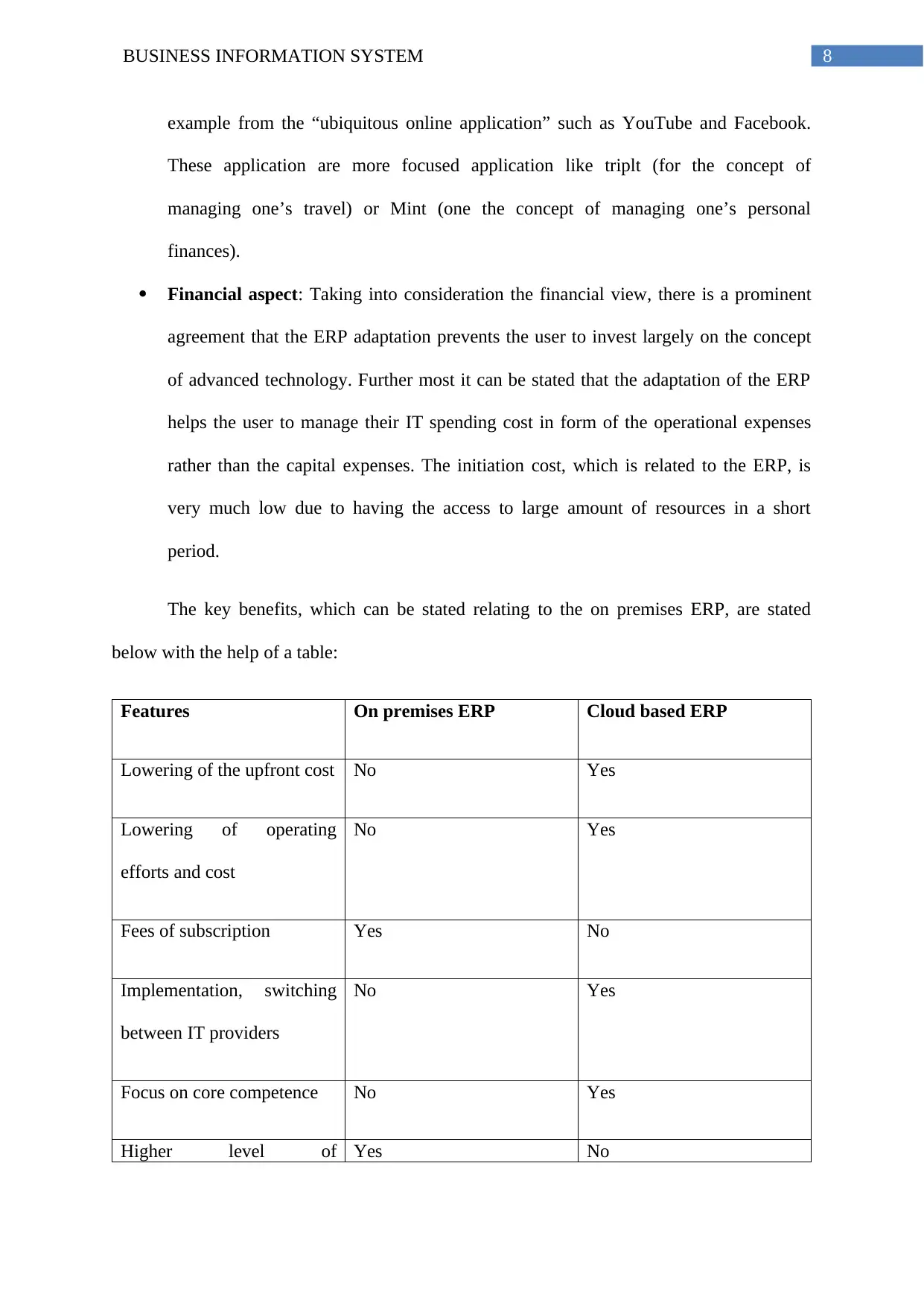
8BUSINESS INFORMATION SYSTEM
example from the “ubiquitous online application” such as YouTube and Facebook.
These application are more focused application like triplt (for the concept of
managing one’s travel) or Mint (one the concept of managing one’s personal
finances).
Financial aspect: Taking into consideration the financial view, there is a prominent
agreement that the ERP adaptation prevents the user to invest largely on the concept
of advanced technology. Further most it can be stated that the adaptation of the ERP
helps the user to manage their IT spending cost in form of the operational expenses
rather than the capital expenses. The initiation cost, which is related to the ERP, is
very much low due to having the access to large amount of resources in a short
period.
The key benefits, which can be stated relating to the on premises ERP, are stated
below with the help of a table:
Features On premises ERP Cloud based ERP
Lowering of the upfront cost No Yes
Lowering of operating
efforts and cost
No Yes
Fees of subscription Yes No
Implementation, switching
between IT providers
No Yes
Focus on core competence No Yes
Higher level of Yes No
example from the “ubiquitous online application” such as YouTube and Facebook.
These application are more focused application like triplt (for the concept of
managing one’s travel) or Mint (one the concept of managing one’s personal
finances).
Financial aspect: Taking into consideration the financial view, there is a prominent
agreement that the ERP adaptation prevents the user to invest largely on the concept
of advanced technology. Further most it can be stated that the adaptation of the ERP
helps the user to manage their IT spending cost in form of the operational expenses
rather than the capital expenses. The initiation cost, which is related to the ERP, is
very much low due to having the access to large amount of resources in a short
period.
The key benefits, which can be stated relating to the on premises ERP, are stated
below with the help of a table:
Features On premises ERP Cloud based ERP
Lowering of the upfront cost No Yes
Lowering of operating
efforts and cost
No Yes
Fees of subscription Yes No
Implementation, switching
between IT providers
No Yes
Focus on core competence No Yes
Higher level of Yes No
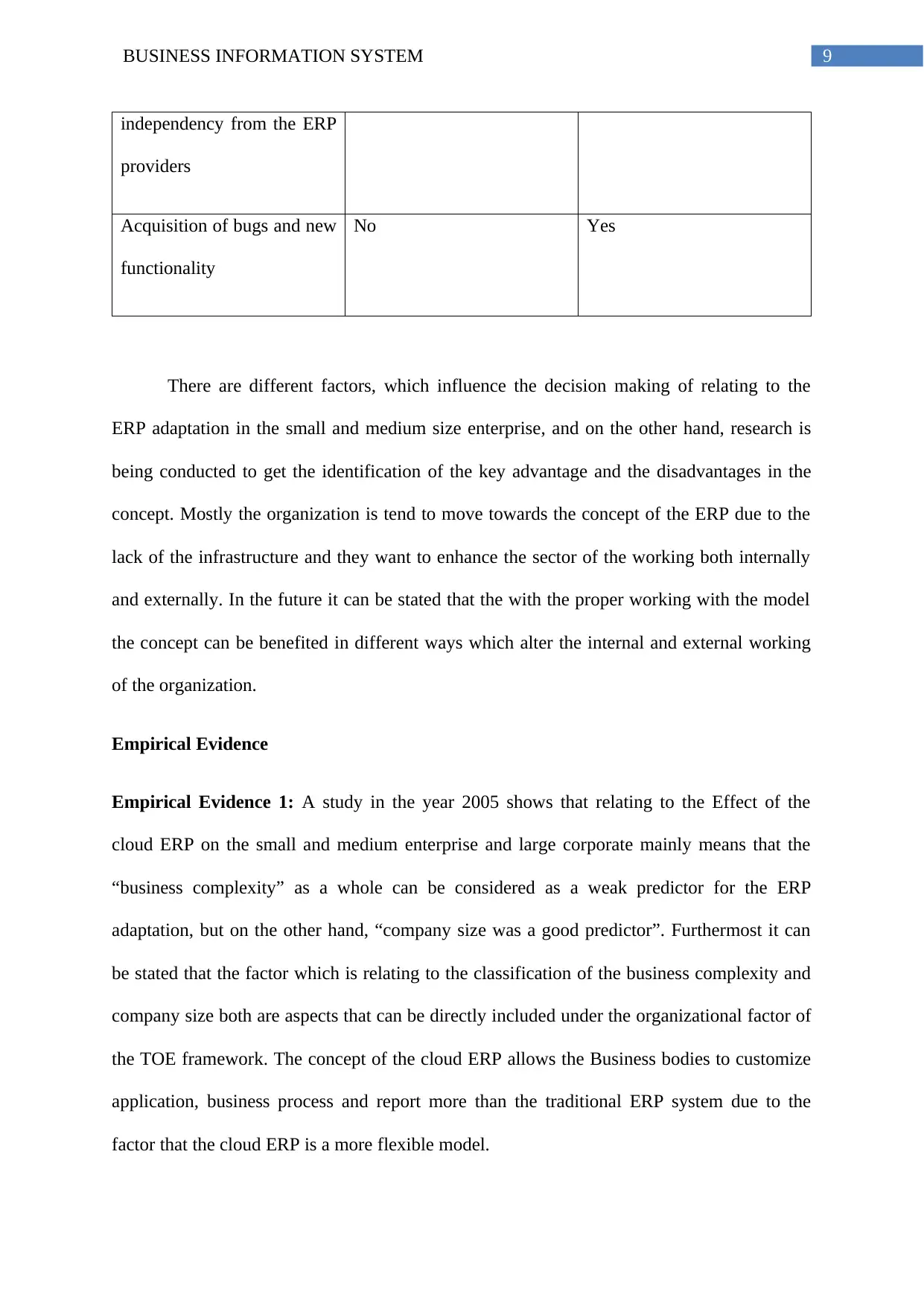
9BUSINESS INFORMATION SYSTEM
independency from the ERP
providers
Acquisition of bugs and new
functionality
No Yes
There are different factors, which influence the decision making of relating to the
ERP adaptation in the small and medium size enterprise, and on the other hand, research is
being conducted to get the identification of the key advantage and the disadvantages in the
concept. Mostly the organization is tend to move towards the concept of the ERP due to the
lack of the infrastructure and they want to enhance the sector of the working both internally
and externally. In the future it can be stated that the with the proper working with the model
the concept can be benefited in different ways which alter the internal and external working
of the organization.
Empirical Evidence
Empirical Evidence 1: A study in the year 2005 shows that relating to the Effect of the
cloud ERP on the small and medium enterprise and large corporate mainly means that the
“business complexity” as a whole can be considered as a weak predictor for the ERP
adaptation, but on the other hand, “company size was a good predictor”. Furthermost it can
be stated that the factor which is relating to the classification of the business complexity and
company size both are aspects that can be directly included under the organizational factor of
the TOE framework. The concept of the cloud ERP allows the Business bodies to customize
application, business process and report more than the traditional ERP system due to the
factor that the cloud ERP is a more flexible model.
independency from the ERP
providers
Acquisition of bugs and new
functionality
No Yes
There are different factors, which influence the decision making of relating to the
ERP adaptation in the small and medium size enterprise, and on the other hand, research is
being conducted to get the identification of the key advantage and the disadvantages in the
concept. Mostly the organization is tend to move towards the concept of the ERP due to the
lack of the infrastructure and they want to enhance the sector of the working both internally
and externally. In the future it can be stated that the with the proper working with the model
the concept can be benefited in different ways which alter the internal and external working
of the organization.
Empirical Evidence
Empirical Evidence 1: A study in the year 2005 shows that relating to the Effect of the
cloud ERP on the small and medium enterprise and large corporate mainly means that the
“business complexity” as a whole can be considered as a weak predictor for the ERP
adaptation, but on the other hand, “company size was a good predictor”. Furthermost it can
be stated that the factor which is relating to the classification of the business complexity and
company size both are aspects that can be directly included under the organizational factor of
the TOE framework. The concept of the cloud ERP allows the Business bodies to customize
application, business process and report more than the traditional ERP system due to the
factor that the cloud ERP is a more flexible model.
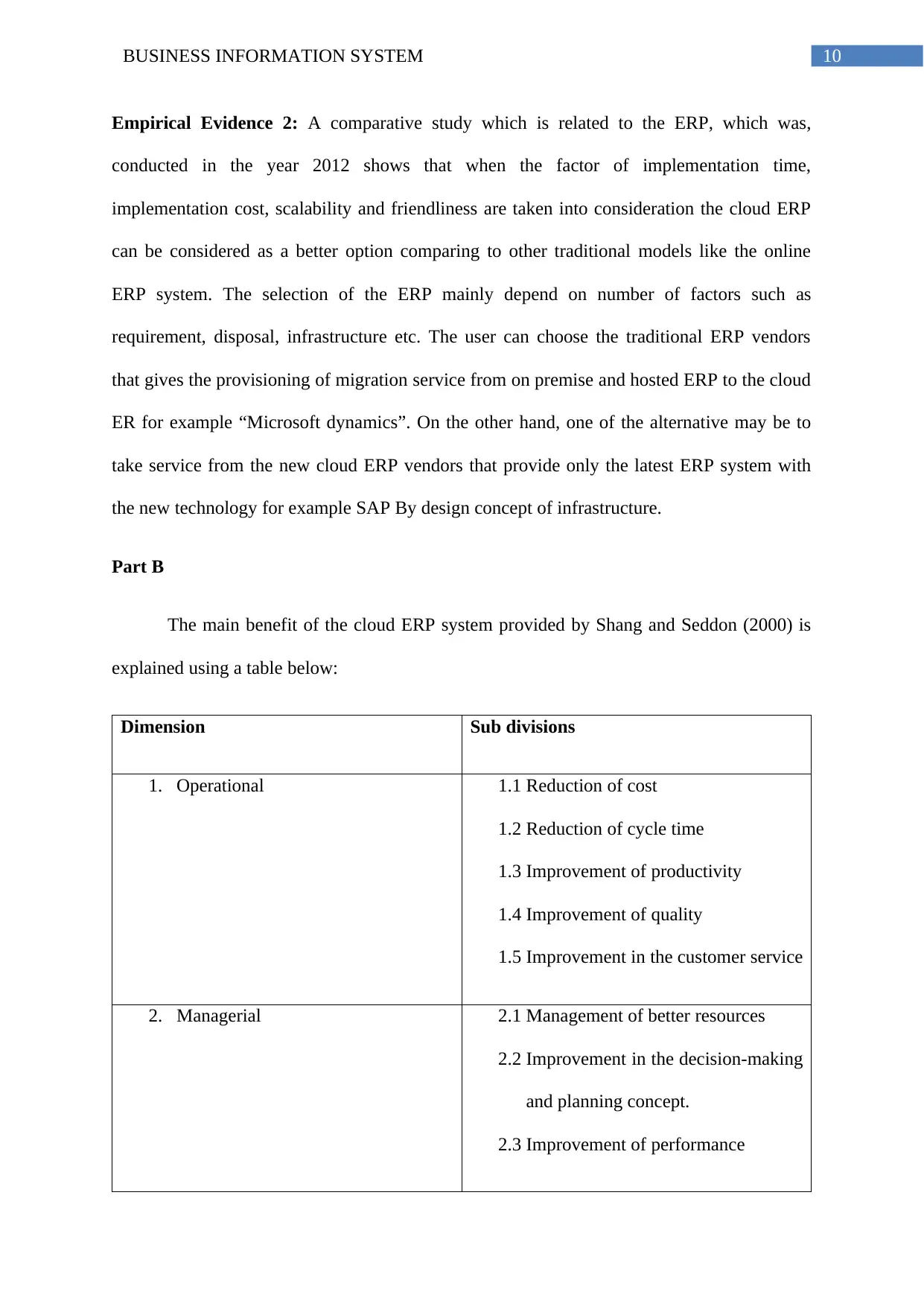
10BUSINESS INFORMATION SYSTEM
Empirical Evidence 2: A comparative study which is related to the ERP, which was,
conducted in the year 2012 shows that when the factor of implementation time,
implementation cost, scalability and friendliness are taken into consideration the cloud ERP
can be considered as a better option comparing to other traditional models like the online
ERP system. The selection of the ERP mainly depend on number of factors such as
requirement, disposal, infrastructure etc. The user can choose the traditional ERP vendors
that gives the provisioning of migration service from on premise and hosted ERP to the cloud
ER for example “Microsoft dynamics”. On the other hand, one of the alternative may be to
take service from the new cloud ERP vendors that provide only the latest ERP system with
the new technology for example SAP By design concept of infrastructure.
Part B
The main benefit of the cloud ERP system provided by Shang and Seddon (2000) is
explained using a table below:
Dimension Sub divisions
1. Operational 1.1 Reduction of cost
1.2 Reduction of cycle time
1.3 Improvement of productivity
1.4 Improvement of quality
1.5 Improvement in the customer service
2. Managerial 2.1 Management of better resources
2.2 Improvement in the decision-making
and planning concept.
2.3 Improvement of performance
Empirical Evidence 2: A comparative study which is related to the ERP, which was,
conducted in the year 2012 shows that when the factor of implementation time,
implementation cost, scalability and friendliness are taken into consideration the cloud ERP
can be considered as a better option comparing to other traditional models like the online
ERP system. The selection of the ERP mainly depend on number of factors such as
requirement, disposal, infrastructure etc. The user can choose the traditional ERP vendors
that gives the provisioning of migration service from on premise and hosted ERP to the cloud
ER for example “Microsoft dynamics”. On the other hand, one of the alternative may be to
take service from the new cloud ERP vendors that provide only the latest ERP system with
the new technology for example SAP By design concept of infrastructure.
Part B
The main benefit of the cloud ERP system provided by Shang and Seddon (2000) is
explained using a table below:
Dimension Sub divisions
1. Operational 1.1 Reduction of cost
1.2 Reduction of cycle time
1.3 Improvement of productivity
1.4 Improvement of quality
1.5 Improvement in the customer service
2. Managerial 2.1 Management of better resources
2.2 Improvement in the decision-making
and planning concept.
2.3 Improvement of performance
Secure Best Marks with AI Grader
Need help grading? Try our AI Grader for instant feedback on your assignments.
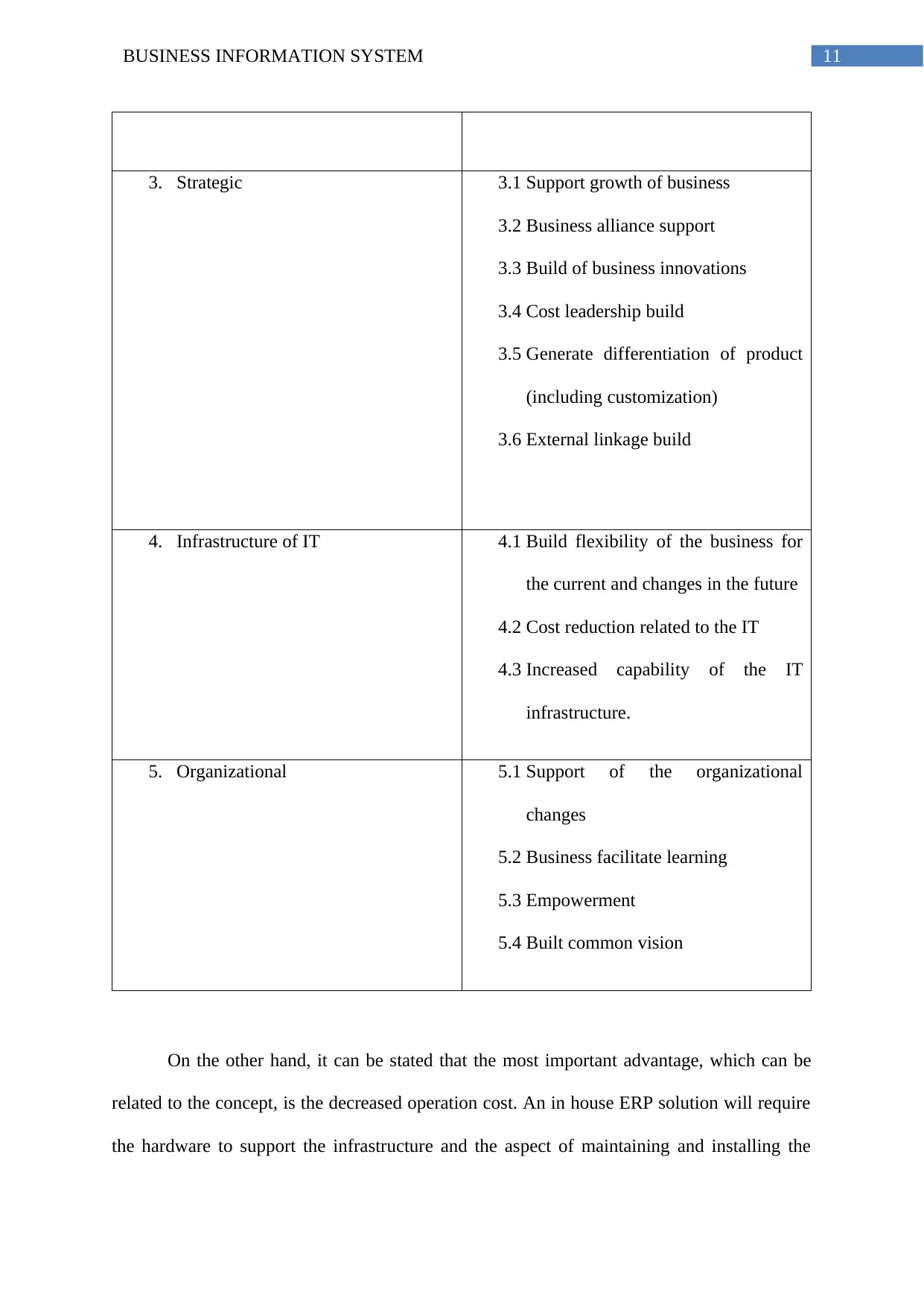
11BUSINESS INFORMATION SYSTEM
3. Strategic 3.1 Support growth of business
3.2 Business alliance support
3.3 Build of business innovations
3.4 Cost leadership build
3.5 Generate differentiation of product
(including customization)
3.6 External linkage build
4. Infrastructure of IT 4.1 Build flexibility of the business for
the current and changes in the future
4.2 Cost reduction related to the IT
4.3 Increased capability of the IT
infrastructure.
5. Organizational 5.1 Support of the organizational
changes
5.2 Business facilitate learning
5.3 Empowerment
5.4 Built common vision
On the other hand, it can be stated that the most important advantage, which can be
related to the concept, is the decreased operation cost. An in house ERP solution will require
the hardware to support the infrastructure and the aspect of maintaining and installing the
3. Strategic 3.1 Support growth of business
3.2 Business alliance support
3.3 Build of business innovations
3.4 Cost leadership build
3.5 Generate differentiation of product
(including customization)
3.6 External linkage build
4. Infrastructure of IT 4.1 Build flexibility of the business for
the current and changes in the future
4.2 Cost reduction related to the IT
4.3 Increased capability of the IT
infrastructure.
5. Organizational 5.1 Support of the organizational
changes
5.2 Business facilitate learning
5.3 Empowerment
5.4 Built common vision
On the other hand, it can be stated that the most important advantage, which can be
related to the concept, is the decreased operation cost. An in house ERP solution will require
the hardware to support the infrastructure and the aspect of maintaining and installing the
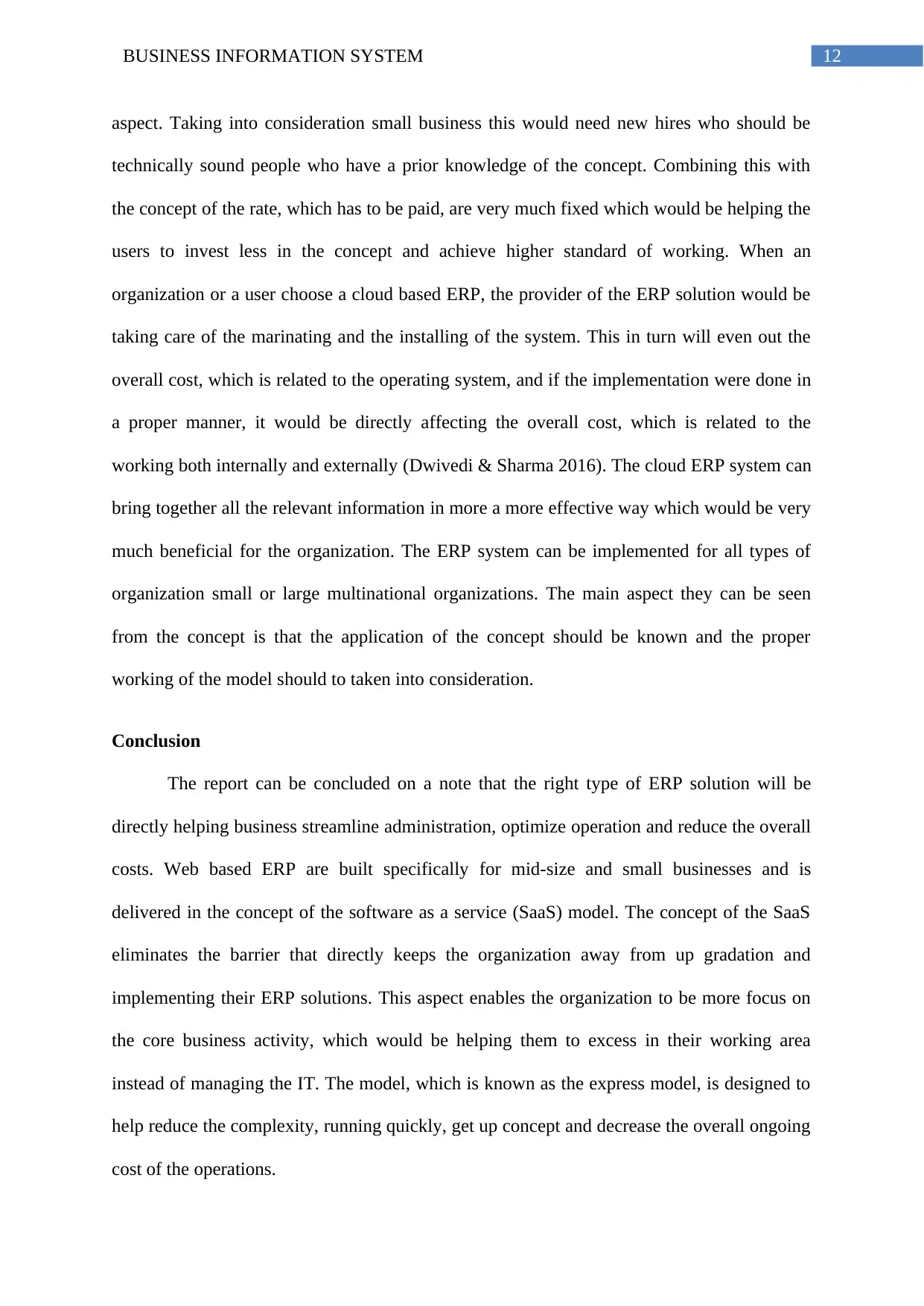
12BUSINESS INFORMATION SYSTEM
aspect. Taking into consideration small business this would need new hires who should be
technically sound people who have a prior knowledge of the concept. Combining this with
the concept of the rate, which has to be paid, are very much fixed which would be helping the
users to invest less in the concept and achieve higher standard of working. When an
organization or a user choose a cloud based ERP, the provider of the ERP solution would be
taking care of the marinating and the installing of the system. This in turn will even out the
overall cost, which is related to the operating system, and if the implementation were done in
a proper manner, it would be directly affecting the overall cost, which is related to the
working both internally and externally (Dwivedi & Sharma 2016). The cloud ERP system can
bring together all the relevant information in more a more effective way which would be very
much beneficial for the organization. The ERP system can be implemented for all types of
organization small or large multinational organizations. The main aspect they can be seen
from the concept is that the application of the concept should be known and the proper
working of the model should to taken into consideration.
Conclusion
The report can be concluded on a note that the right type of ERP solution will be
directly helping business streamline administration, optimize operation and reduce the overall
costs. Web based ERP are built specifically for mid-size and small businesses and is
delivered in the concept of the software as a service (SaaS) model. The concept of the SaaS
eliminates the barrier that directly keeps the organization away from up gradation and
implementing their ERP solutions. This aspect enables the organization to be more focus on
the core business activity, which would be helping them to excess in their working area
instead of managing the IT. The model, which is known as the express model, is designed to
help reduce the complexity, running quickly, get up concept and decrease the overall ongoing
cost of the operations.
aspect. Taking into consideration small business this would need new hires who should be
technically sound people who have a prior knowledge of the concept. Combining this with
the concept of the rate, which has to be paid, are very much fixed which would be helping the
users to invest less in the concept and achieve higher standard of working. When an
organization or a user choose a cloud based ERP, the provider of the ERP solution would be
taking care of the marinating and the installing of the system. This in turn will even out the
overall cost, which is related to the operating system, and if the implementation were done in
a proper manner, it would be directly affecting the overall cost, which is related to the
working both internally and externally (Dwivedi & Sharma 2016). The cloud ERP system can
bring together all the relevant information in more a more effective way which would be very
much beneficial for the organization. The ERP system can be implemented for all types of
organization small or large multinational organizations. The main aspect they can be seen
from the concept is that the application of the concept should be known and the proper
working of the model should to taken into consideration.
Conclusion
The report can be concluded on a note that the right type of ERP solution will be
directly helping business streamline administration, optimize operation and reduce the overall
costs. Web based ERP are built specifically for mid-size and small businesses and is
delivered in the concept of the software as a service (SaaS) model. The concept of the SaaS
eliminates the barrier that directly keeps the organization away from up gradation and
implementing their ERP solutions. This aspect enables the organization to be more focus on
the core business activity, which would be helping them to excess in their working area
instead of managing the IT. The model, which is known as the express model, is designed to
help reduce the complexity, running quickly, get up concept and decrease the overall ongoing
cost of the operations.

13BUSINESS INFORMATION SYSTEM
Paraphrase This Document
Need a fresh take? Get an instant paraphrase of this document with our AI Paraphraser
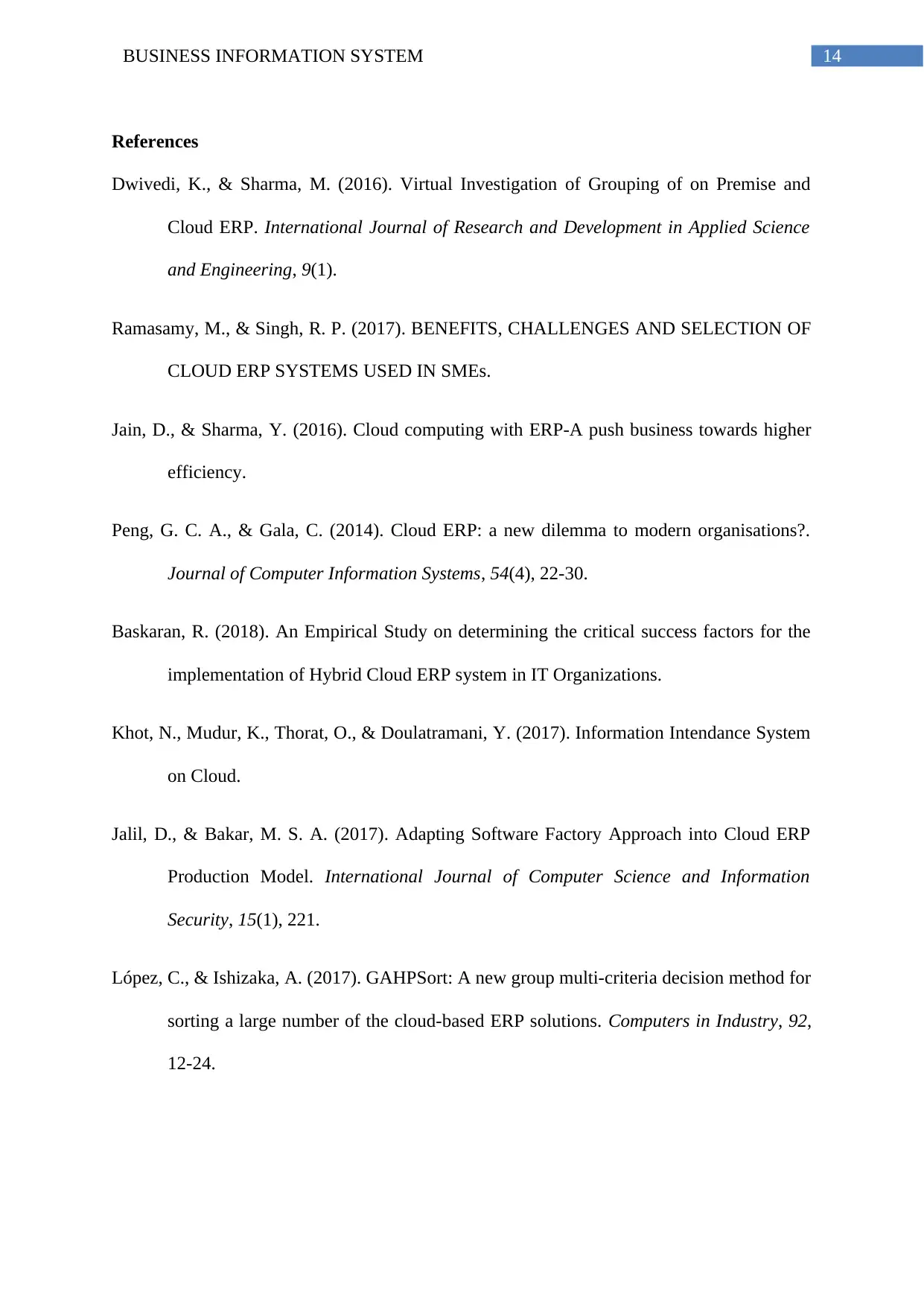
14BUSINESS INFORMATION SYSTEM
References
Dwivedi, K., & Sharma, M. (2016). Virtual Investigation of Grouping of on Premise and
Cloud ERP. International Journal of Research and Development in Applied Science
and Engineering, 9(1).
Ramasamy, M., & Singh, R. P. (2017). BENEFITS, CHALLENGES AND SELECTION OF
CLOUD ERP SYSTEMS USED IN SMEs.
Jain, D., & Sharma, Y. (2016). Cloud computing with ERP-A push business towards higher
efficiency.
Peng, G. C. A., & Gala, C. (2014). Cloud ERP: a new dilemma to modern organisations?.
Journal of Computer Information Systems, 54(4), 22-30.
Baskaran, R. (2018). An Empirical Study on determining the critical success factors for the
implementation of Hybrid Cloud ERP system in IT Organizations.
Khot, N., Mudur, K., Thorat, O., & Doulatramani, Y. (2017). Information Intendance System
on Cloud.
Jalil, D., & Bakar, M. S. A. (2017). Adapting Software Factory Approach into Cloud ERP
Production Model. International Journal of Computer Science and Information
Security, 15(1), 221.
López, C., & Ishizaka, A. (2017). GAHPSort: A new group multi-criteria decision method for
sorting a large number of the cloud-based ERP solutions. Computers in Industry, 92,
12-24.
References
Dwivedi, K., & Sharma, M. (2016). Virtual Investigation of Grouping of on Premise and
Cloud ERP. International Journal of Research and Development in Applied Science
and Engineering, 9(1).
Ramasamy, M., & Singh, R. P. (2017). BENEFITS, CHALLENGES AND SELECTION OF
CLOUD ERP SYSTEMS USED IN SMEs.
Jain, D., & Sharma, Y. (2016). Cloud computing with ERP-A push business towards higher
efficiency.
Peng, G. C. A., & Gala, C. (2014). Cloud ERP: a new dilemma to modern organisations?.
Journal of Computer Information Systems, 54(4), 22-30.
Baskaran, R. (2018). An Empirical Study on determining the critical success factors for the
implementation of Hybrid Cloud ERP system in IT Organizations.
Khot, N., Mudur, K., Thorat, O., & Doulatramani, Y. (2017). Information Intendance System
on Cloud.
Jalil, D., & Bakar, M. S. A. (2017). Adapting Software Factory Approach into Cloud ERP
Production Model. International Journal of Computer Science and Information
Security, 15(1), 221.
López, C., & Ishizaka, A. (2017). GAHPSort: A new group multi-criteria decision method for
sorting a large number of the cloud-based ERP solutions. Computers in Industry, 92,
12-24.
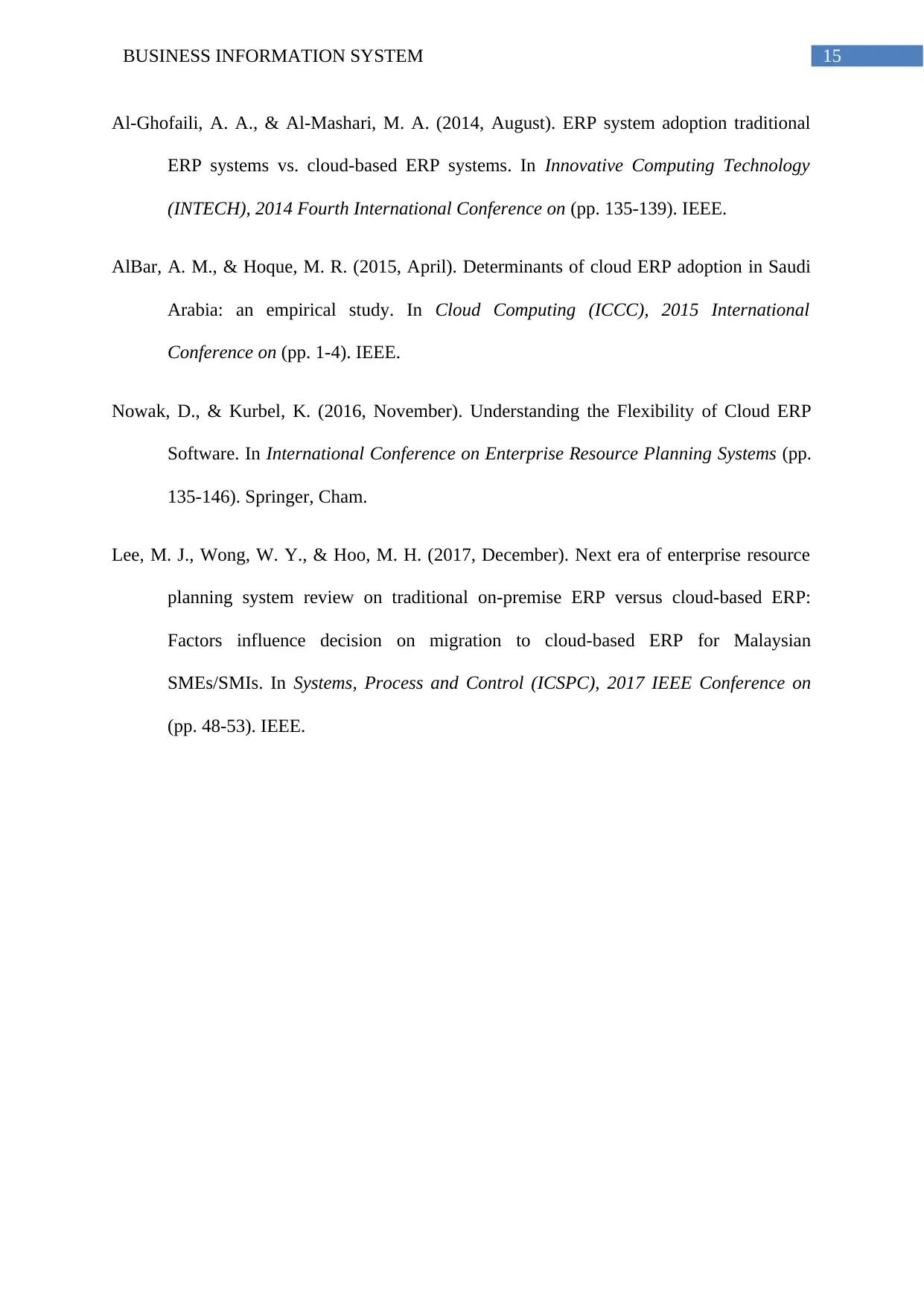
15BUSINESS INFORMATION SYSTEM
Al-Ghofaili, A. A., & Al-Mashari, M. A. (2014, August). ERP system adoption traditional
ERP systems vs. cloud-based ERP systems. In Innovative Computing Technology
(INTECH), 2014 Fourth International Conference on (pp. 135-139). IEEE.
AlBar, A. M., & Hoque, M. R. (2015, April). Determinants of cloud ERP adoption in Saudi
Arabia: an empirical study. In Cloud Computing (ICCC), 2015 International
Conference on (pp. 1-4). IEEE.
Nowak, D., & Kurbel, K. (2016, November). Understanding the Flexibility of Cloud ERP
Software. In International Conference on Enterprise Resource Planning Systems (pp.
135-146). Springer, Cham.
Lee, M. J., Wong, W. Y., & Hoo, M. H. (2017, December). Next era of enterprise resource
planning system review on traditional on-premise ERP versus cloud-based ERP:
Factors influence decision on migration to cloud-based ERP for Malaysian
SMEs/SMIs. In Systems, Process and Control (ICSPC), 2017 IEEE Conference on
(pp. 48-53). IEEE.
Al-Ghofaili, A. A., & Al-Mashari, M. A. (2014, August). ERP system adoption traditional
ERP systems vs. cloud-based ERP systems. In Innovative Computing Technology
(INTECH), 2014 Fourth International Conference on (pp. 135-139). IEEE.
AlBar, A. M., & Hoque, M. R. (2015, April). Determinants of cloud ERP adoption in Saudi
Arabia: an empirical study. In Cloud Computing (ICCC), 2015 International
Conference on (pp. 1-4). IEEE.
Nowak, D., & Kurbel, K. (2016, November). Understanding the Flexibility of Cloud ERP
Software. In International Conference on Enterprise Resource Planning Systems (pp.
135-146). Springer, Cham.
Lee, M. J., Wong, W. Y., & Hoo, M. H. (2017, December). Next era of enterprise resource
planning system review on traditional on-premise ERP versus cloud-based ERP:
Factors influence decision on migration to cloud-based ERP for Malaysian
SMEs/SMIs. In Systems, Process and Control (ICSPC), 2017 IEEE Conference on
(pp. 48-53). IEEE.

16BUSINESS INFORMATION SYSTEM
1 out of 16
Related Documents
Your All-in-One AI-Powered Toolkit for Academic Success.
+13062052269
info@desklib.com
Available 24*7 on WhatsApp / Email
![[object Object]](/_next/static/media/star-bottom.7253800d.svg)
Unlock your academic potential
© 2024 | Zucol Services PVT LTD | All rights reserved.




